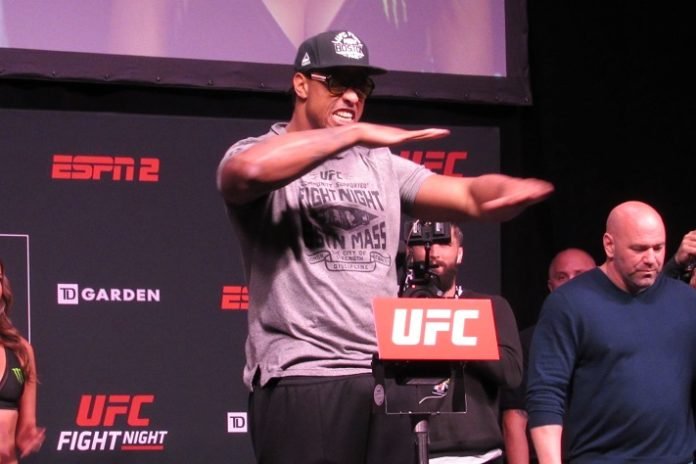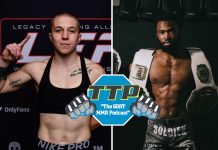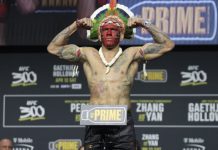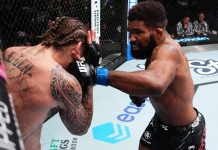
Greg Hardy’s mere presence in the UFC has been controversial from the outset, and following his most recent misstep in Boston, he’s once again in the spotlight for the wrong reasons.
To understand how Greg Hardy’s presence in the UFC is related to the business of misogyny, look back a little. The 1960s was a decade of global transition, an era of social change, but also one where people were mastering the art of television advertising. As a result, the marketing of luxury and specialized products reached a new high. There was an abundance of food, clothing, retirement programs, and even “midlife-crisis” products for a very large section of society. Present something the right way, and you could market anything.
However, as one end of the population enjoyed these privileges, another was fighting for the bare minimum. It was during this time that the civil rights movement peaked.
Some stark similarities can be drawn between this era and the times we are living in. Back in the 60s, second-wave feminism was finally ramping up to find success. With the introduction of contraceptives and birth control pills, pursuing careers became more viable for women. Similarly today, with movements like #MeToo, workplaces are becoming safer for women. Other parallels can be drawn between inequality and the way it’s being addressed. We live in times where the world has the highest number of billionaires, but at the same time universal healthcare isn’t available.
However, one difference that does stand out is that in the past, people were demanding rights to stop exploitation. Today, the protest is against the exploiters. Enter Greg Hardy and misogyny marketing.
Misogyny Marketing:
Misogyny has always existed in the mainstream media; it is only recently that we have begun focusing on it. However, what’s interesting about today is the fact that misogyny is no longer just an element. Today it has evolved into a product with its own set of consumers.
It’s not sold directly. It’s carefully packaged with buzzwords like “triggered”, “snowflake”, and so on. Look no further than Colby Covington. The beauty of this packaging is that the moment you point out that a product is promoting hate, you’re in the wrong. Suddenly you’re a “white knight” or “keyboard warrior.”
Core concepts behind this marketing tool:
1. Culture: The easiest way to normalize anything is by ingraining it as a part of the society’s culture and past. If you have a problem with it, you’re opposing my culture. If you’re questioning why I’m permitting this, you’re questioning my identity. No matter if it’s right or wrong, as long as my culture says so, it becomes important and unquestionable.
Example: WWE in Saudi Arabia
On one end, the WWE was leading a feminist campaign of equality back home in the United States while on the other they were blatantly bowing down to the demand of the Saudis regarding not allowing women to compete, given the limited set of rights women have in the kingdom. When questioned about this, WWE Executive Vice President of Talent, Live Events, and Creative Triple H said, “I understand that people are questioning it, but you have to understand that every culture is different and just because you don’t agree with a certain aspect of it, it doesn’t mean it’s not a relevant culture…You can’t dictate to a country or a religion about how they handle things but, having said that, WWE is at the forefront of a women’s evolution in the world and what you can’t do is affect change anywhere by staying away from it…While women are not competing in the event, we have had discussions about that and hope that in the next few years they will be.”
The statement explains everything — apart from how exactly a culture is threatened if a woman wrestles. It also ignores the obvious: if a major problem is that wrestling gear violates the dress code observed in Saudi Arabia, why is the issue about gender, given male wrestlers are also in violation?
2. The luxury of victimhood: At some point, our society began accepting those in positions of power and authority as victims. Victimhood mentality is something that comes from a failure to understand what exactly the message behind a movement is. It comes out of fear and hatred. This can be broken down with the help of an example.
Example: Riot Games
A basic example of entitlement to victimhood comes from a well-publicized lawsuit involving Riot Games. Sued by female employees past and present over sex discrimination claims, one popular quote which came out of the case was “that Riot Games is the last remaining safe-haven for white teenage boys.” The fear that some forces were working against white teens was obviously overblown, whereas the reality was that people were looking for equality.
3. Refuting consequences: “Speech has power. Words do not fade. What starts out in sound, ends in deed”. This quote by Abraham Heschel clearly explains what speech can achieve. Words lead to actions.
Example: Colby Covington
So far everything that has come out of Colby Covington’s mouth has largely been treated as a gimmick. In his innumerable interviews thus far, journalists have failed to ask him whether he understands the kind of message is he propagating, and its consequences. When he pushes racial stereotypes, sexist call-outs, and publicly uses anti-LGBT slurs, no one holds him accountable solely because “it’s a gimmick.” But the lines have clearly become blurred.
Before we go ahead:
We’ll now finally be talking about Greg Hardy, but before that a few clarifications. It is not being suggested here that organizations like the UFC aren’t making efforts to make themselves more inclusive and approachable. It is also understood that at a point, people tend to go overboard in modern social movements, and take things out of context.
However, at the same time, one must not deny the obvious: that there is a conscious effort to promote hateful views in the society today, and private organizations are capitalizing on it to gain profits.





















